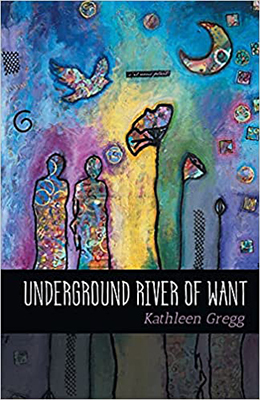|

Underground River of Want
by Kathleen Gregg
21 Poems ~ 27 Pages
Format: 5 ½’’ x 8 ½’’
Publisher: Leah Huete de Maines
Price: $14.99
ISBN: 978-1-64662-599-4
To Order: www.finishinglinepress.com
Or on Amazon.com
Reviewed by Michael Escoubas
I have always marveled at how seeming randomness returns later to infuse life with meaning. Case in point: Kathleen Gregg’s lead poem recalls how she felt on a fateful day when paramedics strapped her dad onto a stretcher for transport to the hospital. The distraught family holding fast to each other, as the radio blares, I wanna hold your hand.
The collection: Underground River of Want.
The poem, “January 1964.”
Not long thereafter …
A cold tug of alarm shivers
through my body. My sister gathers me in.
Unasked questions are swallowed, churn
in my stomach for one terrible week. Until,
the dreaded call from mom; a bedside
summons that wrenches
the two of us from sleep.
This excerpt from “January 1964,” which channels the Beatles classic, sets the stage for a thin volume of poems which is thicker than blood with emotional depth.
One of the purposes of art is to serve as a “rudder” during tough times. When seas are rough the goal is not to capsize the boat. Underground River of Want, is ample proof. I sense that Kathleen Gregg understands this. Without poetry the ship of her life founders.
“Loss” is a key theme for Gregg. Through a series of losses the poet invites us into the surging sea of her father’s death, sexual trysts, and her failed marriage. These amputations become the source of growth within her suffering.
I am moved by the poem, “Father-less.” Without her father to tell her “No” she is in want of an emotional compass when a boy’s eyes say, “I will touch you.” This poem is of central importance. The collection’s title finds its meaning here. Still in mourning, the next several poems explore the emotional vacuum left by her father’s loss.
It is important to note that poetic form plays an important role here. The poems early-on feature gaps in word-spacing and erratic indentations. This is purposeful writing. Gregg’s use of form represents how she is feeling . . . she is showing a disjointed life. Her pain is expressed through poetic form as in this excerpt from “Heartbreak is a Winter Wind”:
it blows like the downward lash
of a whip on bare flesh
deep sting
lacerating hope
“Heartbreak” uses powerful similes to underscore the depth of heartache:
it blows like the fat flat of a palm
shoving you backwards
it blows like the stiff straw
of a broom.
The dust of love is swept away.
With an adult daughter of my own, I too, know what it means when someone you love has lost the North Star that she needs.
The first 12 poems set the stage for a subtle shift in the poet’s fortunes. The remaining 9 poems gently raise the curtain on light. The venetian blinds are opened with a slight pull of a cord. The turn occurs in the poem, “Sometimes Freedom Is a ’93 Dodge Shadow:
Boxy, khaki green, low-end model
fully equipped
with rolldown windows,
with one of its keys permanently stuck
in the ignition,
and with two years left on the loan.
I call it my consolation prize
for losing at marriage.
But damn, that Dodge is everything
My ex-husband is not.
I wanted to jump up with a “High Five”! At this point, there is a change in both tone and form. By tone, the feel of winter’s unrelenting chill is replaced by hints of lightness, tinges of hope. By form, erratic word and line-spacing is replaced by coherent, steady stanzas and couplets. Form is steady because the poet is steady. Life is different now.
There is one good reason for the changes described above. However, if I reveal it, I wouldn’t be doing my job as a reviewer. The best I can do is this quote by Willa Cather (1873-1947), “You must find your own quiet center of life and write from that to the world. In short, you must write to the human heart, the great consciousness that all humanity goes to make up.”
This is what good poets do. This is what Kathleen Gregg does.
|


